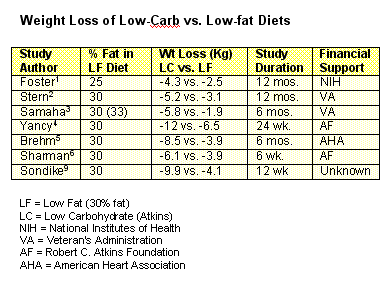
 The Atkins Scientific Research – Deceit and Disappointment:
The Atkins Scientific Research – Deceit and Disappointment:
A Vegan Health Article from All-Creatures.org
These vegan health articles are presented to assist you in taking a pro-active part in your own health.
See All-Creatures.org Health Position and Disclaimer
From http://www.drmcdougall.com
Comparing Atkins with a “Low-fat” Diet is Deceptive
All of the papers purporting the comparison of the Atkins Diet with a “low-fat” diet have deceived the public – and their authors must have known better.[1,3-9] The “low-fat” diet used is actually approximately 30% of the calories from fat in all cases. Consider, the average American eats a diet with 32% to 38% of calories coming from fat. In each case the diet that is labeled “low-fat” is in truth the conventional, always-known-to-fail, calorie-restricted diet. In one of the major studies,3 before the diet began the participants’ diets were 33% fat; the goal was to reduce to 30% fat – but in the end their “low-fat” diets actually contained 33% of the calories as fat (the same as before they started) – so where is the low-fat part of the comparison alleged by the title of the article? – “A low-carbohydrate as compared with a low-fat diet in severe obesity.”

For the short-term (6 to 24 weeks) the Atkins approach betters the calorie-restricted diet by 4 to 12 pounds (2 to 5.5 Kg).4 Some of this early weight loss (up to 8 pounds) reflects water loss (from diuresis and loss of glycogen stores). However, at 12 months, research financed independent of Atkins has found the difference in weight loss to be insignificant (2.1 Kg or less).[1,2] The reason people fail to continue to lose weight on the Atkins Diet is primarily because of lack of adherence to the diet. Interestingly, researchers from one of the long-term studies reported those on the calorie-restricted diet who dropped out continued to lose the same amount of weight as those who stayed in the study, whereas those in the Atkins group were less likely to lose weight if they dropped out. This finding, along with the weight gains that were seen between 6 and 12 months on the Atkins Diet led researchers to raise the possibility that the Atkins Diet was less sustainable (than the portion controlled, calorie-restricted diet).[2] (I believe the reason Dr. Atkins, himself was so grossly overweight was, not because of the lack of effectiveness of a ketogenic diet, but because even he could not follow his own diet for long.)
The Atkins Diet is inherently difficult to stick with because of the underlying mechanism for weight loss – the diet makes people sick. Followers of this kind of diet complain of reduced appetite, nausea, and fatigue – all symptoms of illness, which result in a natural reduction in daily food intake – which includes consuming fewer calories. You can only stay sick for so long before you long for relief and return to eating more carbohydrates and less fat.
Go on to
A
Low-fat Diet Solves the Obesity Epidemic
Return to
The
Atkins Scientific Research – Deceit and Disappointment
Return to Vegan Health Articles
Visit Food Hazards in Animal Flesh and By-products
All-Creatures.org Health Position and Disclaimer
We began this archive as a means of assisting our visitors in answering many of their health and diet questions, and in encouraging them to take a pro-active part in their own health. We believe the articles and information contained herein are true, but are not presenting them as advice. We, personally, have found that a whole food vegan diet has helped our own health, and simply wish to share with others the things we have found. Each of us must make our own decisions, for it's our own body. If you have a health problem, see your own physician.







